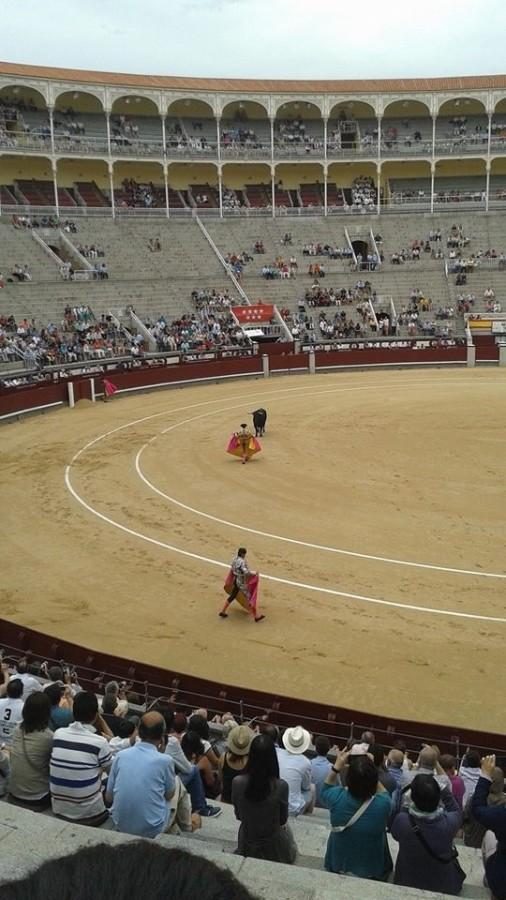That Fight Was Bull
Photograph by Mr. Charlie Lovett
Some of the GATEway students decide to view the bullfight before deciding what they think of it.
June 23, 2014
The bullfight scheduled for seven o’clock on Sunday was optional – this was the first warning. However, when Mr. Turf asked how many of us wanted to attend in order to purchase enough entry tickets, nearly all of us raised our hands. The second sign, I suppose, was on our Segway tour through Madrid just days after arriving.
Our tour guide casually mentioned while passing by one of the many tapas restaurants that the chefs prepare the tails of the bulls deliciously. Scrumptious. This sparked a conversation I had with my dad just days before boarding the plane where he explained, “bullfighting is alright since the meat is preserved and sold at local restaurants.” I began conversing with our tour guide to gain knowledge of this tradition that seemed so foreign to me. I wondered which restaurants are lucky enough to receive the bull’s meat to which his response stopped me in my tracks. He explained in slow speed Spanish, “Many restaurants get the meat because bulls are so big… and because they kill six.” I was already anxious about watching one bull get killed, let alone six. He continued, “Each battle is quick, just fifteen minutes long.” When Mr. Turf double-checked who was still interested in attending the fight, I raised my hand.
After a taking three metro trains and several stops to get there, we reached Las Ventas bullring. The arena was beautifully constructed and intricately designed with red and brown bricks. We took the cement steps to our level, just a few rows up from the dirt ring. Immediately upon sitting down, two gates opened and a bull came sprinting out. Toreadors hid behind wooden doors, inaccessible by bull’s horns. One by one the toreador would step out from safety and into battle, waving their pink and yellow capes that incite the bulls forceful attack. The gates opened again as a picador led a blindfolded horse into danger. The bull was veered into ramming into the side of the horse, who wore padding, but still seemed to endure pain. One horse was swept from under its feet, forcing the toreador sitting atop to flee for safety; while humans are placed in an environment where they can save their own lives, the animals are trapped, inferior and defenseless. The sound of a horn signalled the exit of the horse and entrance of banderilleros with spears. Once the first two were stabbed into the neck of the bull, Nicky Sherwood and Danielle Ben-David bursted into tears and shielded their eyes for the remainder of the fight. The matador then stepped out to the middle of the ring, cape and sword in hand, and began tiring breaking down the bull both physically and mentally. The bull continually tried to run through the cape and with each run he only weakened. Blood dripping and heart pounding, the final stab caused the bull to drop to his knees and ultimate death. As he was dragged out by three horses, Nicky, Danielle, and Brittney left as well.
With each death, more and more of our classmates returned home to our residencia. While the few who remained were certainly pained to watch, the battles became easier to observe; the repetition of the process six times became boring, uninteresting, and unnecessary. In fact, throughout Europe bullfighting has been outlawed, and Spain remains one of the only countries to still allow the killing of the bulls. Furthermore, our tour guide mentioned that in Spain however, 55% of Spaniards are for the culture and tradition, while the rising 45% are against what appears to be animal cruelty. However, after many discussions, Mrs. Smith enlightened me to taking a different point of view. She explained that, “while the bullfight did seemed to be tortuous, Spaniards honor the animal more than in typical animal killings.” I would like to walk away from the experience believing that there is honor and respect when it comes to the killings, yet the humiliation and “torture” will forever be hard to stomach.






